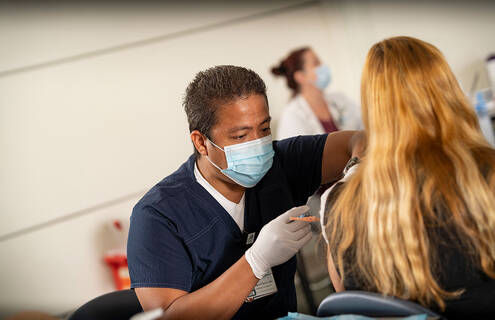
Sleep is the bedrock of human health. Yet 50 to 70 million Americans—one in three adults—experience chronic sleep problems.
There are lots of reasons you may feel you are not getting the sleep you need.
Stress, obesity, hypertension, poor sleep habits or a sleep disorder could be affecting your sleep quality.
You may also simply not be getting the sleep your body requires. Adults need seven to nine hours of sleep daily. Infants, kids and teens need even more.
"Anybody who thinks it's fine to get six hours of sleep is probably losing out," says Adam J. Sorscher, MD, Director of Sleep Health at Alice Peck Day Memorial Hospital. "A lot of people don't know what they're missing. Sometimes, little sleep is likened to the effects of alcohol, where people drink and don't recognize their impairment."
Dartmouth Health sleep experts share five surprising facts about sleep.
1. It's more than feeling tired
The consequences of no sleep go beyond feeling exhausted.
A 2024 study shows that insufficient, irregular and poor-quality sleep is associated with atrial fibrillation and chronic conditions like hypertension, depression, obesity, and anxiety disorders.
Sleep disorders tend to stick around if they aren't treated, resulting in long-term health problems. Being exhausted can result in inflammation, advanced aging and heart disease.
"Those consequences can't simply be reversed as if they never happened," Sorscher says.
2. You can fix poor sleep habits
"People's minds become overactive when it's time to go to sleep," says Brooke G. Judd, MD, Section Chief of Sleep Medicine at Dartmouth Hitchcock Medical Center's Sleep Disorders Center. "They've unintentionally learned bad sleep patterns and then engage in behaviors that worsen the problem."
More than 80 sleep disorders exist, the most common being insomnia. Medication and underlying medical conditions can be to blame, as can poor bedtime habits—like scrolling your phone in bed or worrying about work as your head hits the pillow.
Dartmouth Health uses a treatment called cognitive behavioral therapy. It can help you control or eliminate negative thoughts and worries that keep you awake.
Studies have found that cognitive behavioral therapy for insomnia is as effective as using sleep medications in the short term and more effective in the long term.
About 80 percent of the people who try this therapy over four to eight sessions see improvements in their sleep.
"The good news is that these poor sleep patterns can be unlearned," Judd says.
3. The link between sleep apnea and obesity
In the United States, millions of adults are living with obstructive sleep apnea, a sleep disorder caused by an upper airway becoming blocked during sleep.
People with sleep apnea briefly stop and restart breathing as they sleep, preventing them from getting complete rest. In some cases, it can happen hundreds of times in one night. Sleep apnea is related to the anatomy of a person's airways, necks, tonsils, jaws or tongues.
Research shows that having obesity increases your risk of developing sleep apnea.
For people with obesity, the underlying issue is often a buildup of fatty tissue in the tongue, neck and upper airway.
A 2024 study by the New England Journal of Medicine found that GLP-1 medicines like tirzepatide can dramatically reduce sleep apnea.
Subscribe to the Living Better newsletter
Your trusted resource for reliable and up-to-date health and wellness information in the Northeast. Get it delivered to your inbox every other week.
4. Your body's internal clock is key
Circadian rhythm, the name given to your body's 24-hour internal clock, controls your body's sleep-wake cycle. Melatonin, the hormone the pineal gland produces at night, serves as a time cue for your circadian rhythm.
Your circadian rhythm depends on sun or light exposure in the morning and darkness at night to keep it aligned.
Blue light from computer or phone screens, lack of daylight, shiftwork and jet lag can upset your circadian rhythm.
"Circadian rhythm disorders are rooted in a mismatch between an internal rhythm and the world in which you're living," Sorscher explains.
He says getting daylight in the morning can shift your circadian phase and help you to fall asleep earlier at night.
Researchers are learning more about the role of circadian rhythm in sleep. In 2023, scientists identified a protein in mice that can stabilize the body's circadian rhythms by buffering the brain's response to light—a finding that advances efforts to better treat sleep disorders and jet lag.
5. Long COVID and anxiety might be keeping you awake
Sleep problems became more common during the pandemic from increased psychological distress, remote work and isolation. Being sick with COVID and long COVID are also linked to sleep disturbances.
Research suggests that about 40% of people with long COVID report sleep issues among their symptoms. Problems can include insomnia, daytime sleepiness, waking up several times a night or not feeling refreshed in the morning.
Also disrupting sleep are increased levels of depression, stress and anxiety.
"The stress of life is affecting sleep," Sorscher says. "Depression and anxiety are on the rise in our world, and these things are contributing to insomnia."
So is the shrinking boundary between work and life.
"We've got jobs that need to be done 24-7, and it's not natural for humans," Sorscher says. "We're creatures that are meant to be active in the day and asleep at night. And when we try to do things differently, it can throw us off."
But it's possible to get back on track. After all, getting to sleep doesn't have to be a nightmare.


